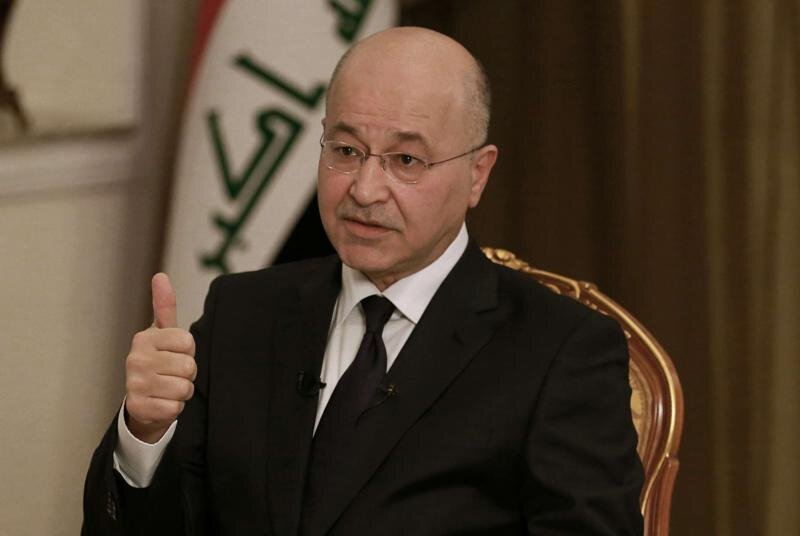Iraqi president: Baghdad playing vital role in Tehran-Riyadh talks

TEHRAN — In an interview with CNN’s Fareed Zakaria, Barham Salih, Iraq’s President, discussed a variety of issues from the Joint Comprehensive Plan of Action (JCPOA) to Iran-Saudi talks.
In response to a question regarding a fundamental change in Saudi Arabia’s foreign policy, Salih said that he believes Iraq has changed and has been projecting itself and its values to the entire neighborhood. (With reference to how the Saudis look at Iraq).
“This is not about a zero-sum game. Iran is our neighbor. We have vital national interests in developing good relations with Iran,” he noted, adding that Iraq does not intend to go back to the days of Saddam Hussein where it was at war with its neighbor. “We fought eight years, Iraqis were committed to this war and we have to fight it with our blood and our treasure on behalf of others.”
“We're not going to do that again,” the Iraqi president noted, adding, “By the same logic, Saudi Arabia is an important neighbor of Iraq. It's in our interest to develop Iraq's relations with what I call its Arab friend.”
Iran is a “major, major actor” in West Asia
Elsewhere in the interview, Zakaria went on to ask that one of the things that Joe Biden was trying to do in his trip to the region was to find a way to have a better understanding of what to do about Iran and he was trying to convince them, particularly the Israelis and the Saudis, that it actually makes sense for Iran to go and the United States to go back into the 2015 nuclear deal to put limits on Iran's nuclear program.
He asked Salih, “Do you think President Biden is right? Should we all be trying to get that deal put back together?”
In response, the Iraqi president said that Iran is “a major, major actor in that part of the world and for me in Iraq. We have long borders with Iran. We have all kinds of interaction, social, cultural, common security interest.”
So obviously, he added, this is an issue of consequence to Iraq and is a consequence to the wider region and indeed the world. There is no military solution to the nuclear dispute, he noted.
“We need a security arrangement in the Middle East where we can come together to combat terrorism which remains a major problem,” Salih elaborated.
“We need to bring the neighborhood together as part of a common architecture to push back against these elements but also really attend to the fundamental challenges that the Middle East is facing, jobs, economic challenges that we are faced with, the terrible, terrible climate changes that are affecting the entire neighborhood,” the Iraqi president outlined, stressing that a nuclear deal should exist.
According to the Iraqi president, Iraq is playing a very important role in trying to mediate between the Saudis and the Iranians.
“There have been a number of conversations that have taken place in Baghdad between Iran and other Arab neighbors and there are some important atmospherics that have improved,” he added.
Earlier, Iraqi Foreign Minister Fuad Hussein announced that in addition to hosting the ongoing Tehran-Riyadh talks, Baghdad is also a host to separate bilateral talks between Iran and two other Arab states.
Speaking on July 1, Hussein announced that concurrent with Tehran-Riyadh negotiations, talks are underway between Iran and Egypt as well as Iran and Jordan.
We need infrastructure to connect our economies together
Elsewhere in the interview, the Iraqi president spoke of the need to establish a mechanism to connect the West Asian economies together.
“We are blessed with having oil but we also have very, very serious challenges, economic and social challenges. We need infrastructure that can connect our economies together. We need common action against climate change. Iraq cannot do it alone. Saudi Arabia cannot do it alone. Iran cannot do it alone. The Turks cannot do it alone,” he asserted.
Syria, Salih noted, has to be brought back into the Arab fold eventually.
“We need to find a way by which we get Syria out of the mess that it is in today, (and) has been in for so long, while we are focused on the headlines of interstate rivalries between Iran, Saudis, this and that. At the end of the day there are really big, big challenges confronting each and every state in that part of the world,” he stated.
“We don't want to go back to the days of the past where we are part of access against another. We did that and we paid dearly for it. We have too many priorities to do that again,” the Iraqi leader concluded.
Leave a Comment